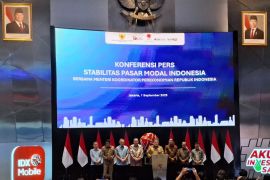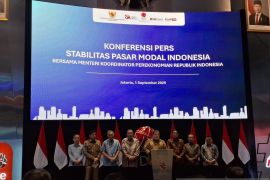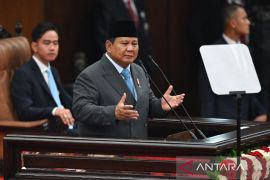"Indonesia tends to not follow the global economic trend. Their economies may have recorded a slowdown, but in the last two quarters, in comparison, we alone have shown faster growth," he noted here on Thursday.
Nasution explained that the global economy is moving towards a slowdown in 2016, but the Indonesian government had been striving to maintain public spending and boosting investment to ensure that the national economy remained stable.
Nasution even forecast that in the first quarter of 2016, the countrys economy would improve compared to the previous quarter by growing at some 5.1 to 5.2 percent, driven by infrastructure development since early this year.
"In general, it should be better than that in the previous quarter. Perhaps, it will not be as good as one might have imagined, but investment and infrastructure development have, so far, helped to improve the economy," he pointed out.
The Central Bureau of Statistics recorded that countrys economy had grown in the past two quarters, at 4.73 percent and 5.04 percent, respectively in the third and fourth quarters of 2015.
Although it had yet to grown in line with its potential, its growth at 4.79 percent in 2015 was still better than the average growth in the developed and developing countries.
In the draft revised 2016 budget, the government has assumed macro-economic growth at 5.3 percent due to improving household consumption and investment performance.
The International Monetary Fund (IMF) has forecast that the worlds economy would only grow at 3.2 percent this year, down 0.2 percent from its earlier prediction of 3.4 percent in January 2016.
IMF chief economist Maurice Obstfeld stated at a press conference on World Economic Outlook in Washington that the revision reflected the economic slowdown in various countries.
Obstfeld remarked that the trend was apparent since last year, marked by the sudden sales of risk assets, increasing market concerns, and a sharp decline in the prices of oil and other commodities.
The IMF has forecast advanced economies, such as the United States, to grow 2.4 percent; while the European zone comprising Germany, France, Italy, and Spain, 1.5 percent; Japan, 0.5 percent; and others outside G7, 2.1 percent.
For developing countries, the IMF has forecast a growth of 6.5 percent for China, 7.5 percent for India, and 4.8 percent for ASEAN plus 5 comprising Indonesia, Malaysia, the Philippines, Vietnam, and Thailand.
In view of this, the IMF has proposed three main policies encompassing approaches to improve the monetary, fiscal and economic structure to overcome the slowdown and maintain growth in the midst of this global trend.(*)
Editor: Heru Purwanto
Copyright © ANTARA 2016











